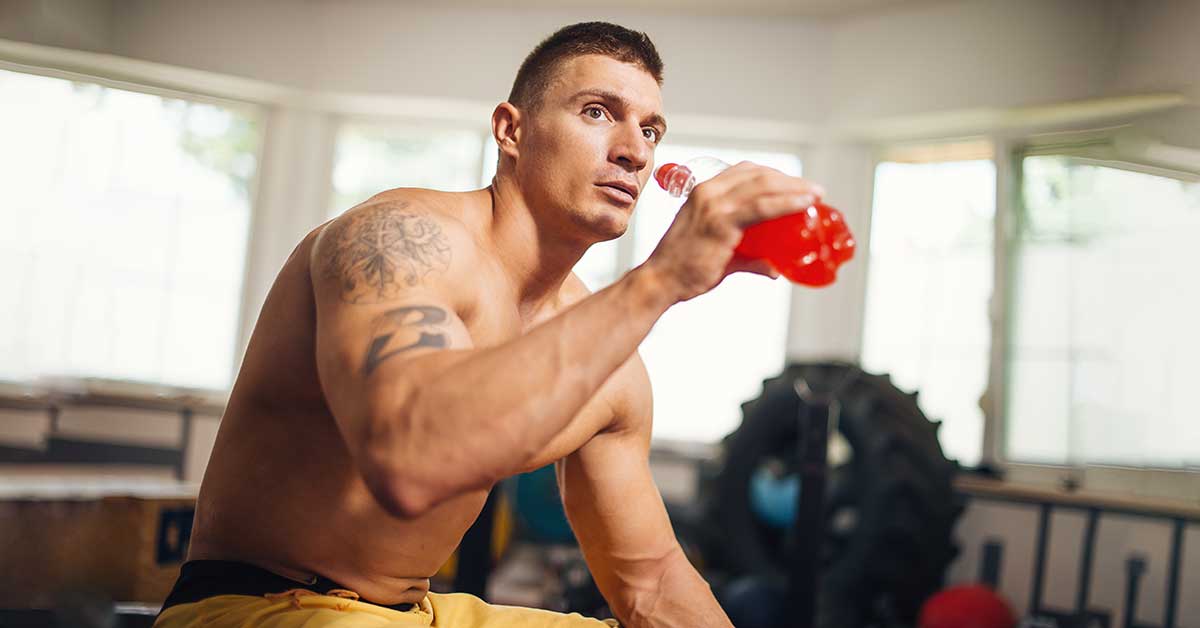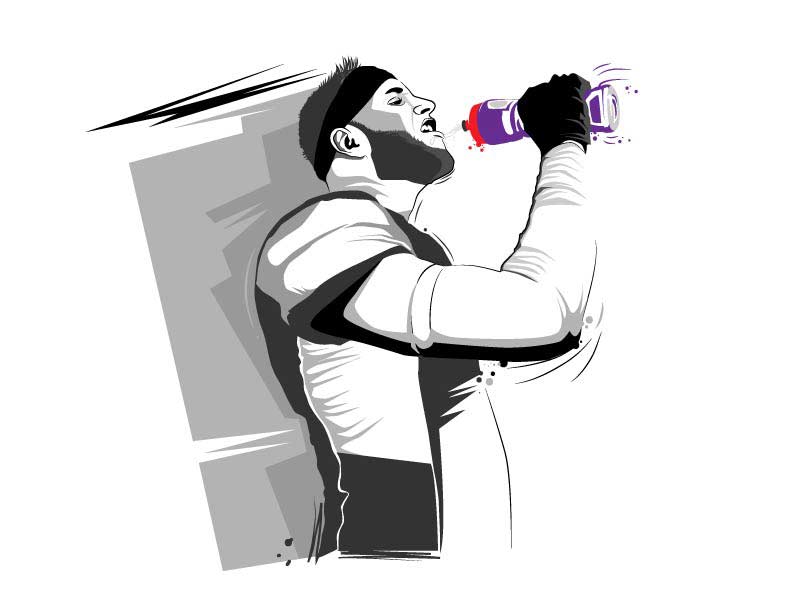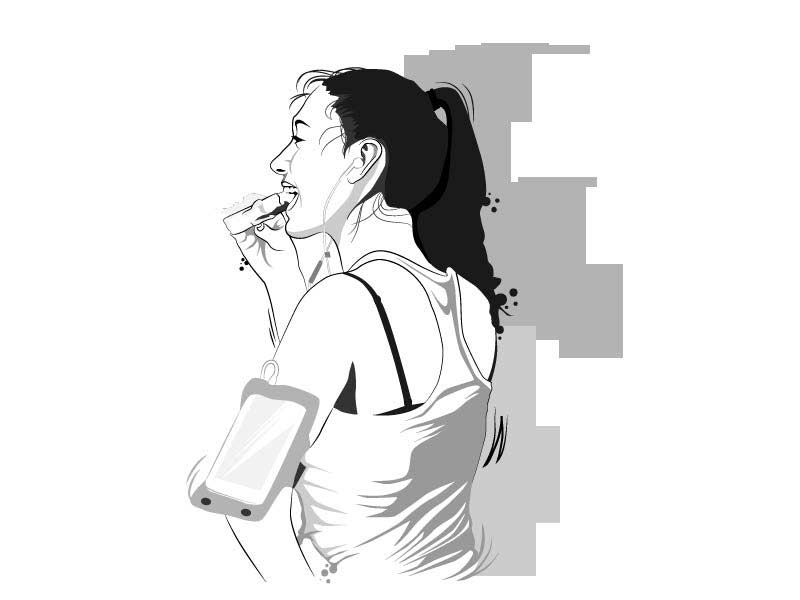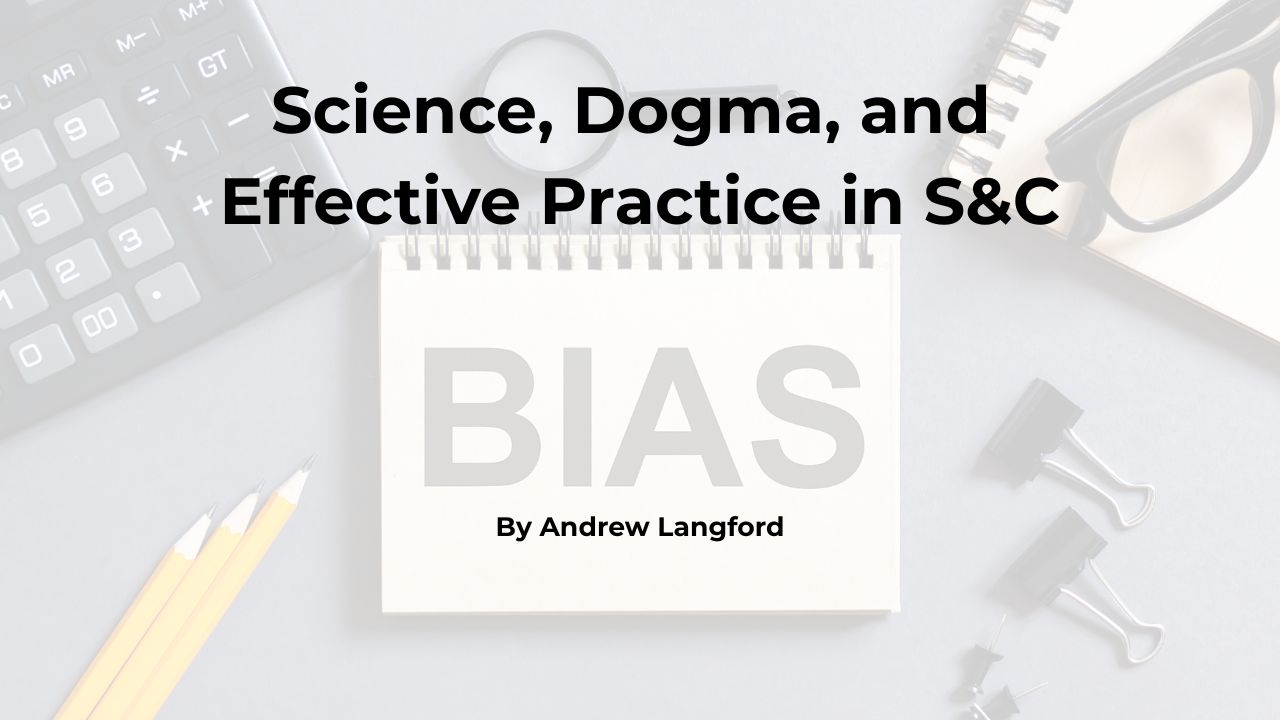[mashshare]
Serious athletes are always looking for ways to get a leg up on their competition. This often means using the best equipment, practicing hard and on their personal time, and getting the nutrition their bodies need to function at their very best.
Another part of a serious athlete’s regimen is refueling their bodies after an intense workout with one of several types of sports drinks. While these sports drinks are advertised as an essential part of an athlete’s lifestyle, you might be surprised to learn the key ingredient in most sports drinks is none other than sugar—and lots of it. Four of the market’s leading sports drinks have more sugar than a conventional full-size candy bar.
That’s not to say that sports drinks aren’t a viable drink for athletes—but they’re better suited for serious, intense athletes who need to refuel after a grueling training session, practice, or game. These drinks, while tasty, are not beneficial for youth and high school athletes in many cases.
And the amount of sugar they pack isn’t ideal for anyone’s oral health. The common denominator with sports energy drinks, regardless of who consumes them, is the amount of sugar and its effects on an athlete’s teeth and gums. And while teeth don’t help an athlete run, skate, jump, kick, swing, or lunge, oral health care can have an impact on the entire body.
Poor oral health can lead to a sub-par performance when you hit the court, floor, ice, or diamond. Share on XOne path to poor oral health is not supplementing sports drinks with water. Another is not taking care of your teeth as you should, whether it’s proper brushing and flossing or wearing a mouth guard and the right headgear while competing. Regardless of the reason, one thing is certain: poor oral health has the potential to lead to a sub-par performance when you hit the court, floor, ice, or diamond. This post will examine why. Let’s dive in.
How Big of an Issue is Poor Oral Health for Athletes?
You might be surprised that elite athletes have some of the worst oral health issues, even if they brush and floss. According to a report from the UCL Eastman Dental Institute published in the British Dental Journal, elite athletes—such as Olympians and professional athletes across 11 sports—had tooth decay, gum recession, and acid erosion.
Specifically, the study surveyed 352 high-caliber athletes while also asking how they cared for their teeth. According to the report, the vast majority of athletes brushed their teeth twice a day, flossed, didn’t smoke, and visited the dentist regularly. Yet, a routine dental checkup on all of the athletes discovered the following:
- Nearly half of all the high-caliber athletes studied showed signs of untreated tooth decay
- A majority of the athletes had gum inflammation, which is an early sign of gum disease
And about one-third of the athletes revealed that their oral health issues harmed their training or performance.
One-third of the athletes reported that oral health issues hurt their training or performance. Share on XSo if oral health habits are on point, what is behind these dental issues? Three things: sports drinks, sports bars, and energy gels. Specifically, 87 percent of the athletes surveyed reported regularly consuming sports drinks, and 59 percent and 70 percent ate sports bars and energy gels, respectively. The study verified the increased risk of oral health issues that may arise when athletes consume these regularly without taking additional steps in routine dental health practices.

We’ll get into how these sports drinks, sports bars, and energy gels can affect the teeth in a later section. We’ll also tell you what athletes can do to offset some of the effects of consuming these items.
The good news from the study is that the majority of the athletes surveyed said they were willing to do more to care for their mouth should they continue consuming drinks, bars, and gels with their training regime. And that’s a good thing—because a healthy mouth equals an overall healthy body. We’ll explain more throughout this post.
Sports Drinks 101
Because four of the market’s leading sports drinks have more sugar in one individual 20-ounce bottle than a conventional candy bar, the effects on your teeth can be significant if you’re not careful when drinking them. A 20-ounce bottle of Gatorade, which falls under the PepsiCo umbrella of entities, contains 34 grams of sugar, or about one-third of the daily recommended intake.
PowerAde—the sports drink owned by Coca-Cola—has the same amount of sugar in the same sized bottle. Then there’s Vitaminwater, which sounds much healthier than it is. In fact, it’s not much better when it comes to sugar quantity, as a 20-ounce bottle contains about 32 grams of sugar. We’ll round out this list with chocolate milk, which is advertised as the best post-game beverage for youth teams. Depending on the brand, however, a bottle can contain up to 44 grams of sugar—an even higher amount than Gatorade and PowerAde.
We’re not saying that you should eliminate sports drinks from your practice or game routine, but it’s important to know what you’re consuming—especially as it plays into an athlete’s overall oral health. It’s why following some of the tips and suggestions in this post is important. It’s also why water—that’s right, good ole’ H2O—is by far the best sports drink, whether it’s the only beverage an athlete drinks during play or it’s part of what they consume overall.
Common Oral Health Issues and How They Occur
Everyone knows that sugar is bad for the teeth, but do you understand why? Or how it impacts them?
While sugar is just one piece of the puzzle to bad dental health, it’s a very important piece. Essentially, the mouth is a bacteria battleground. And though this may seem somewhat gross, not all types of bacteria are bad.
One type of mouth bacteria produces acid when it comes in contact with sugar, like the sugar in the sports drinks, sports bars, and energy gels. The acid removes minerals from tooth enamel via a process called demineralization. Tooth enamel serves as a protective outer shell on your teeth. It protects your teeth from hot and cold temperature extremes and tooth decay while keeping the teeth bright and white.

Now, it’s worth noting that your saliva is always acting to offset demineralization via remineralization, which is a process of replacing lost minerals and strengthening tooth enamel. Too many acid attacks in a short time, however, can render remineralization useless. When this occurs, the tooth enamel gradually weakens and tooth decay begins to set in.
If tooth decay is not treated quickly, it can increase to the point where more than a filling may be necessary to correct the issue. In severe cases, decay can spread down to the deepest layers of the tooth, requiring intensive dental procedures, such as root canals.
Gum disease also can have far-reaching consequences. It occurs over time when plaque begins to build up on the teeth, usually due to poor brushing and flossing habits. When we leave plaque untreated, it hardens over time and may cause gum inflammation and bleeding. These are often characteristics of the early stages of gum disease, or gingivitis. If left untreated, they can lead to periodontal disease.
The good news is that we can often reverse gum disease when caught in its early stages. If we don’t catch it soon enough, the whole-body health effects associated with periodontal disease can be very significant. These include bad breath, tooth loss, sensitive teeth, and pain while chewing. And then there are more serious side effects—hormonal changes, a greater risk of developing diabetes, heart disease, and increased risk of stroke.
Common ways to reverse early gum disease include gum cleaning, typically by a dentist, and combining a water flosser with plaque-removing mouthwash in one’s oral care routine.
Effects of Oral Health on Athletic Performance
Think oral health doesn’t have any effect on athletic performance? Think again. And we’re not talking about missing a shift in a hockey game when you get high-sticked in the mouth and need to stop the bleeding. A visit to the dentist can fix that. Poor overall oral health is much more difficult to correct, which is why it’s important to prevent these issues before they become severe.
Here are some of the detrimental health effects poor oral health can have on athletic performance.
Oral health affects the entire body. Poor oral health can have a trickle-down effect on the entire body. Evidence suggests that tooth decay and gum disease can lead to a greater likelihood of infections and inflammation throughout the rest of the body—conditions that could halt an athlete’s training, practice, and play while treated.
Tooth decay and gum disease cause infections and inflammation that can halt an athlete's training, practice, and play while treated. Share on XAnd when we say oral health, we’re not just talking about brushing and flossing. We mean wearing a mouth guard and appropriate protective headgear while participating in sport to prevent dental injuries. Any dental issue—whether it’s trauma from an injury or poor oral health—can impact the entire body.
Poor oral health affects overall wellbeing, quality of life. Another key inhibitor of exceptional athletic performance is mental health. Yes, athletes need to be mentally tough, capable of shaking off bad pitches, bad shots, or poor play to rise above the competition. And to be mentally tough, athletes need the right amount of sleep to help their bodies recover and have the ability to “get in the zone” when they need to. Remember, poor oral health impacts the entire body—mentally and physically. If an athlete’s mood and confidence are off, their performance can suffer accordingly.
Sleep issues. An athlete’s body needs sleep to recover, and tooth issues can greatly impact healthy sleep patterns.
Serious health issues. As noted in the above section, periodontal disease can wreak serious harm to your body. It can lead to an increased risk of developing heart disease, suffering from a stroke, or developing diabetes. Even serious, well-conditioned athletes may experience these harmful side effects.
How Athletes Can Limit Tooth Decay and Oral Health Issues
If you’re working with serious athletes who need or choose to refuel with something high in sodium and glucose after a workout or during practice or competition (like the market-leading sports drinks), know that they aren’t immune from oral health issues that can come from sugar-heavy beverages.
The good news is that there are a variety of ways to combat tooth decay and gingivitis that may result from an uptick in sugar consumption. Here’s a look at how athletes can help reduce their risks of oral health issues when sports drinks, sports bars, and energy gels are part of the norm.
Wash sugar down with water. Tooth decay occurs when sugars produce acids that help accelerate tooth decay. However, if these sugars can’t stick around inside the mouth, they can’t do the damage they would when left to linger. On this note, one of the easiest things athletes can do to reduce their risk of tooth decay is to chase high-sugar drinks with water. The water dilutes the sugars and rinses them from the mouth.
Brush regularly. Dentists recommend that everyone brush at least twice a day and floss at least once each day. Many of us associate basic brushing and flossing with removing food debris that’s lodged between teeth. But they also help remove sugars, plaques, and bacteria from the mouth before they have a chance to do too much harm.
Keep in mind that many elite athletes will shower after an intense training session, practice, or game. To keep their oral health in top-notch condition, athletes also should make brushing a part of their post-practice and post-game routine. Doing so helps remove sugar and bacteria before they have a chance to fester and do true harm. What’s more, if you brush after consuming something high in sugar, the experts say not to brush right away. Instead, they recommend waiting a while to brush; and brushing after showering does this.
Don’t chew tobacco. Though not nearly as many athletes chew tobacco as they did years ago thanks to its well-documented health effects, it remains commonplace in some sports. In addition to increasing the chance of developing heart disease, stroke, and certain types of cancer, smokeless tobacco leads to a greater likelihood of cavities, teeth abrasion, staining, foul breath, loss of jaw bone, gum disease, and other oral health issues. Nearly four percent of all American adults use smokeless tobacco in some way.
Wear a mouth guard. As noted, good oral health means more than just brushing, flossing, and taking care of your mouth—it also means taking steps to minimize the risk of dental injuries. Poor oral health has an impact on the entire body, and sports-related stress can lead to issues such as teeth grinding and dry mouth. So while some athletes wear missing teeth like a badge of honor, know that not taking care of injuries can potentially impact the entire body.
The good news is that you can take steps to prevent oral injuries, and wearing a mouth guard is arguably the easiest and most effective way to do so. For the best protection, a custom-made mouth guard is the ideal preventative solution. For athletes who wear helmets, ensuring the equipment fits properly is another key to preventing dental injuries. An improperly fitting helmet can jostle and move around on the head, which could lead to injury.
See the dentist regularly. Everyone should see a dentist for routine cleanings and checkups at least twice a year, or once every six months. For those with oral health conditions, visiting the dentist quarterly may be suggested.
Seeing the dentist is important for several reasons. One, a dentist will assess the overall condition of the mouth and often catch small issues that can be corrected before they turn into much more significant issues that aren’t as easily—or affordably—corrected. Dentists also monitor levels of tooth decay and gum recession to identify any problems they need to address. And they’ll take the time to remove gum disease-causing plaque buildup that’s festering inside the mouth.
While many of us may view the dentist as nothing more than a tolerated inconvenience, regular visits are essential to maintaining good oral health and continuing to perform at a high level.
Don’t smoke. Though smoking is typically associated with lung issues, it also can wreak havoc on the mouth. Smokers are much more likely to experience periodontal disease as plaque and tartar buildup more quickly thanks to all of tobacco’s ingredients. Smoking also restricts blood flow in the gums, leads to a greater likelihood of developing oral cancer, and can cause bad breath and teeth staining. The vast majority of competitive athletes don’t smoke, but those who do can expect oral health issues, regardless of how often they see the dentist or how dedicated they are to their oral health routine.
Closing Thoughts
We’re not trying to scare you into ditching sports drinks, sports bars, and energy gels altogether. This post intends to let you know what’s inside the food and beverages you consume and how their ingredients might impact your oral health if you’re not careful.
Yes, these sports energy products have their benefits, especially for serious, hard training athletes. But when consuming high quantities of sugar becomes a regular occurrence, it’s important to know how to keep the mouth healthy. Doing so could be the difference between making the team or getting cut and winning the gold medal or no medal at all. Poor oral health can cost you more than you might think.
Since you’re here…
…we have a small favor to ask. More people are reading SimpliFaster than ever, and each week we bring you compelling content from coaches, sport scientists, and physiotherapists who are devoted to building better athletes. Please take a moment to share the articles on social media, engage the authors with questions and comments below, and link to articles when appropriate if you have a blog or participate on forums of related topics. — SF
[mashshare]




